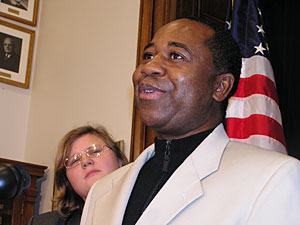|
Audio
Photos
|
St. Paul, Minn. — Charles Dean of Burnsville is a Liberian immigrant who says his life has been destroyed by identity theft. He's been battling to clear his name and credit score since 1983; that's when someone stole a credit application out of his mailbox. The document contained personal information such as his social security number and drivers license number.
"It never ends," he says. "I sit in my living room and shed tears because somebody is playing me and going around using my name. "
Dean estimates he's lost $50,000, including funds stolen from his bank account, money spent trying to clear his credit and missing funds because he has not received several income tax returns. He says this problem is affecting his entire family. Last year when Dean's wife filed her income tax, she was informed that someone in Illinois had already filed a return under her Social Security number.
Attorney General Mike Hatch says his consumer privacy protection package is aimed at helping consumers like Dean. It includes measures to prevent third parties from selling telephone and cellphone records and limits the use of Social Security numbers by businesses. Hatch says the most most significant part of the package would allow consumers to close off their credit information.
"It basically allows you to call the credit bureau and put a freeze on your account. You think something's been stolen and it puts a freeze on your account and you actually get an identity number. Then thereafter if you want it released you use that identity number to release it to specific creditors," Hatch says.
Sen. Satveer Chaudhary, DFL-Fridley, sponsored a version of these kinds of protections last year. He agrees with Hatch that the credit security freeze is important.
"Once your data is breeched, your life can be changed forever," he says. "We need an automatic protection for consumers to be able to have a stop gap and say that your life cannot be ruined any more than it has."
During the last legislative session lawmakers passed a measure that requires businesses to notify consumers if their personal information has been breached. But most healthcare companies and financial institutions were exempted. Backers of this privacy package call these exemptions a loophole.
"This is truly not a loophole. These laws are so comprehensive and they are included in the bankers' safety and soundness regulations," he says.
Tess Rice, the general counsel for the Minnesota Banking Association, says a federal law passed in 2001 already provides consumer privacy protection. She says it's in the banks' interest to protect this information.
"Banks are the ones that bear the financial risk for this kind of thing," according to Rice. "So let's say a customer's information is compromised and someone gets their account number or something like that. It's not the customer that has to pay it. Now a customer goes through a lot of stress trying to fix things but a bank is the one who ends up being financially responsible. So banks have really been protecting information all along."
Sen. Chaudhary says that the federal protections are not sufficient. He says these proposed Minnesota protections are not intended to limit commerce.
"Look we're not saying stop buying things over the Internet. We're just saying let's have some protections in place so we can continue to move forward with technology but with the security that our information will be protected," he says.
According to Chaudhary and other supporters of the privacy protection proposal 10 million people in the U.S. became victims of identity theft last year.






